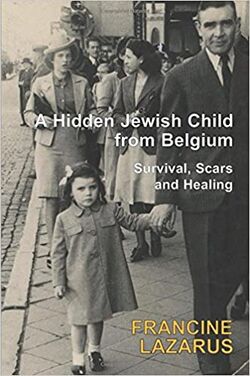Francine Lazarus (F / Belgium, 1938), Holocaust survivor
Francine Lazarus (F / Belgium, 1938), Holocaust survivor
- KEYWORDS : <Hidden Children> -- <Australia>
- MEMOIRS : A Hidden Child from Belgium (2017)
Biography
Book : A Hidden Child from Belgium (2017)
- A Hidden Child from Belgium: Survival, Scars and Healing (London ; Portland, OR : Vallentine Mitchell, 2017)
"Francine Lazarus survived WWII in Belgium hidden with strangers, isolated from her family, and moved from place to place. She witnessed murder and was often injured herself. With her father murdered in Auschwitz, her story continues post-war with the young Francine, neglected and abused by her family, being sent into foster care. At 13 she was sent to work and forced to abandon education. Like most child Survivors, she was told to forget about her war experiences. After an involuntary migration to Australia, her life began to improve. She created a loving family and, in middle age, earned a bachelor's and master's degrees. However, this testimony is much more than a chronicle of Francine's life. Plagued by secrecy, guilt, and shame, she explains how silence affected her life, and the events that prompted her to share her story. The book is particularly valuable because Francine relates her memories, emotions and introspection to the existing literature on Hidden Children. The research on her life, family and their history (including books, papers, archives, and museum documents) is interspersed throughout the book, offering a detailed portrayal of her situation. This description by a Survivor of her reconstruction and self-healing process is rare in existing literature. Furthermore, her immigration, part of the recovery process, is a fascinating and under-researched topic, which allows for a unique insight into post-war expatriation. The issue of reconstruction is what makes this book a considerable addition to current literature. It fills the gap between the intimacy of individual memoirs and the past ten years' academic research conducted on elderly hidden Jewish children by historians, psychologists, and other professionals."--Publisher description.
Sydney Jewish Museum
Francine was born in 1938 in Ixelles, 2 years before the Nazis invaded Belgium.
Belgium was invaded on 10 May 1940, after horrendous stories of Nazi terror towards Jews in occupied countries had already begun filtering through. In Belgium, the Nazis enforced the registration of Jews. No registration meant no food coupons, but registration meant it was easy to find and arrest Jews.
The round-up of Jews began in earnest in 1942. Francine was 4 when her father left her with strangers on a farm and disappeared. Distraught, frightened, and lonely, Francine cried for days. She was relatively safe and had enough food for some time. But eventually, the farmers were caught by the Gestapo, and Francine returned to Brussels. Walking with her father, hearing the heavy footsteps of boots, they hid in a doorway, Francine enveloped in her father’s big black coat.
Francine moved from safe house to safe house. Her clothes became too small, her shoes too tight. She received clothes from the older children, and passed hers on, although riddled with lice. Francine had to hide in a dark cupboard and remain incredibly still, despite the itch from the louse bites.
Francine’s father was caught and sent on the last convoy from Belgium on 31 July 1944, and was subsequently murdered in Auschwitz. The only remaining tangible memory of her father is his ring that Francine still holds onto.
After liberation, not able or willing to care for her, Francine’s mother sent her to foster care. She was intractable and naughty, and she would often be thrown out. Her needs for love and affection were not met here. Francine only began school when she was 8 years old, and finished before she turned 14. Her mother remarried in 1948, and gave birth to Francine’s half-sister, whom Francine had to care for, at the age of 11.
In 1959, Francine left Belgium, arriving in Sydney, Australia, by ship. Francine describes the vista upon her arrival: “Coming through the Heads, I saw this beautiful place bathed in sunshine. I had found my harbour.”
